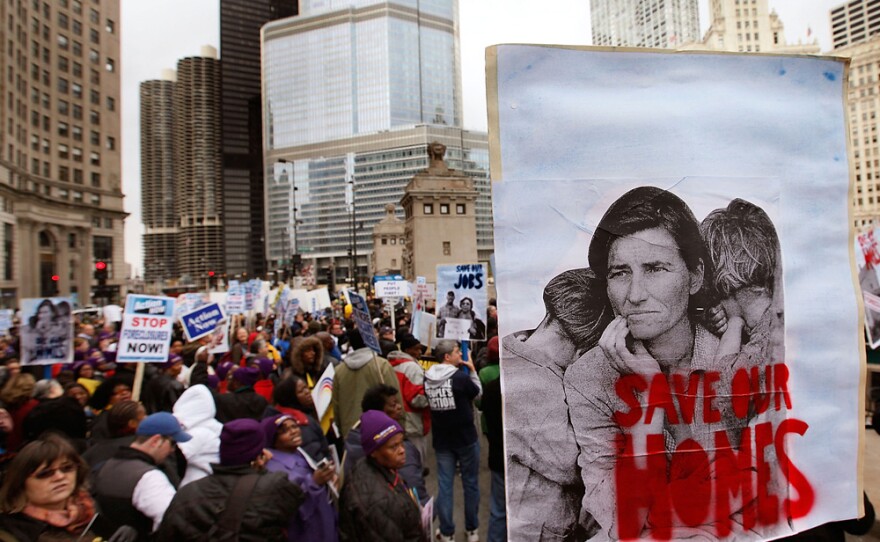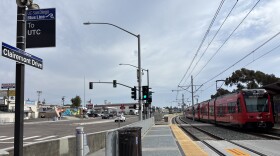When Barack Obama was elected president a year ago this week, the country was already mired in a long recession. But even his top economic advisers didn't know how bad things were going to get.
A few weeks after the vote, unemployment figures were released showing that nearly 600,000 jobs had been lost in November. Economist Christina Romer recalls thinking, "This was a whole new ballgame."
By the time Obama was sworn in two months later, the economy had shed an additional million-plus jobs. And the blizzard of pink slips continued in February. That's when Congress passed the $787 billion stimulus bill, which many economists credit with putting the brakes on the downturn.
"We knew we were in a terrible recession because the private sector had pulled back," says Romer, who is chairwoman of the president's Council of Economic Advisers. "And that's why we did a tax cut, and that's why we did government spending. That's why we did aid to the states.
"And it's absolutely worked."
Signs Of Growth, But Jobs Elusive
Last week, the Commerce Department reported that the economy had begun growing again for the first time in more than a year. America's gross domestic product, or GDP, grew at an annual rate of 3.5 percent between July and September.
But jobs — or the lack of them — have become the key political yardstick for the president and his party.
"Most people don't know what GDP is," says Charlie Cook, editor of the Cook Political Report. "But they know what the unemployment rate is."
The unemployment rate is expected not only to top 10 percent this year, but also to remain high through next year's midterm elections.
"It's an ugly situation to be in, and we're going to have about a year and a half of unemployment at a really high level," Cook says. "We haven't had that kind of situation since the Great Depression. And for a party in power, Democrats really have to worry."
The connection between jobs and votes is not lost on the administration.
When the White House was debating whether to prop up Chrysler this spring, Chief of Staff Rahm Emanuel could recite which congressional districts had large Chrysler plants. And Monday, Obama again stressed that he won't rest until economic growth is accompanied by job growth.
"This is my administration's overriding focus," he said during a meeting with his Economic Recovery Advisory Board.
"Having brought the economy back from the brink, the question is, how are we going to make sure that people are getting back to work and able to support their families?" he said.
Republicans Look For An Opening
The president has been alternately criticized for not doing enough to create jobs and for spending too much money. Congressional Republicans voted almost unanimously against the stimulus package, and they're quick to pounce each time new job losses are reported.

"The stimulus bill's not working," House Minority Leader John Boehner (R-OH) said last month. "The American people are asking, 'Where are the jobs?' "
So far, the polls don't show any big jump in support for Republicans. And last month, White House economist Larry Summers argued in a letter to Boehner that Republican missteps in the last administration are what put the United States in this deep economic hole.
Democrats Headed For A Loss?
Policy arguments like the one between Boehner and Summers may not matter much by the time voters go to the polls a year from now.
"Historically, midterm elections are about the party in power, not the party that's out of office," Cook says. "And it's generally a time when people vent spleens."
"If that pattern holds up, then the fact that people don't really like Republicans and that Republicans don't have a whole lot to say is irrelevant. People are going to be voting against Democrats," he says.
Cook likens next year's election to another recession year: 1982, when President Reagan's Republican Party lost 26 seats in the House.
A loss of that magnitude next year wouldn't be enough to cost Democrats their majority. But unless America's job market shows a big improvement in the next 12 months, a lot of Democratic lawmakers could be looking for new jobs themselves.
Copyright 2022 NPR. To see more, visit https://www.npr.org. 9(MDAzMjM2NDYzMDEyMzc1Njk5NjAxNzY3OQ001))






